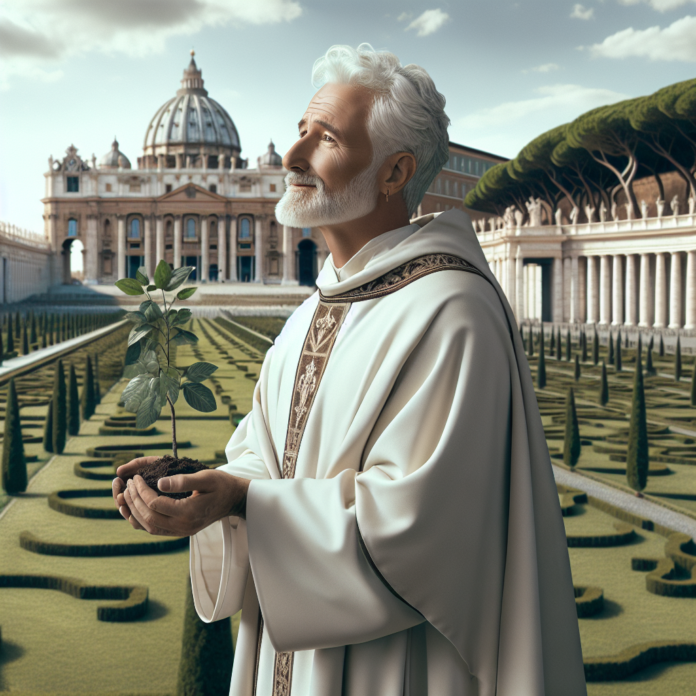Pope Francis Announces New Initiatives for Environmental Stewardship in Latest Encyclical
In a landmark move that underscores the Vatican’s commitment to addressing the global ecological crisis, Pope Francis has unveiled a series of ambitious initiatives aimed at promoting environmental stewardship. This announcement was made in his latest encyclical, "Laudato Si’: A Call to Ecological Renewal," a sequel to his groundbreaking 2015 encyclical "Laudato Si’: On Care for Our Common Home." The document emphasizes urgent actions to combat climate change, protect biodiversity, and foster sustainable development, positioning the Catholic Church as a leading voice in the global ecological movement.
Released on October 15, 2023, the encyclical builds on the theological foundation set forth in its predecessor but moves beyond ethical imperatives to propose concrete strategies for ecological sustainability. "Laudato Si’: A Call to Ecological Renewal" addresses both global policymakers and ordinary individuals, encouraging a collaborative approach to repairing what the Pope describes as a "wounded creation."
Key Initiatives Unveiled
One of the central proposals in the new encyclical is the establishment of a Global Catholic Ecological Network. This comprehensive network aims to unite Catholic institutions, including schools, parishes, and non-governmental organizations worldwide, in a coordinated effort to tackle environmental issues. The network will facilitate education, advocacy, and direct action, reinforcing Pope Francis’s call for ecological conversion within the Church and beyond.
Moreover, the encyclical advocates for the creation of a "Season of Creation," a period between September 1 and October 4, dedicated to ecological reflection, prayer, and action within the Catholic community. This annual event aims to inspire Catholics to engage more deeply with environmental issues, drawing parallels to the Church’s traditional liturgical seasons in fostering spiritual and practical transformation.
Pope Francis also calls for divestment from fossil fuels and increased investment in renewable energy sources, urging Catholic financial institutions to lead by example in transitioning to a more sustainable economy. This initiative reflects a growing recognition within the Church of the moral implications of financial investments and their impact on the environment.
A Theological and Moral Imperative
The encyclical underscores the theological and ethical dimensions of environmental stewardship, framing ecological concerns as integral to the Christian faith. Pope Francis reiterates the interconnectedness of all creation, emphasizing the notion of "integral ecology" that he previously outlined. This concept highlights the inseparable relationship between human well-being and the health of the planet, arguing that addressing social and environmental injustices must go hand in hand.
In a poignant section of the document, Pope Francis reflects on the teachings of Saint Francis of Assisi, the patron saint of ecology, whose reverence for nature serves as a model for contemporary ecological consciousness. The Pope calls upon Catholics to embrace a spirit of humility, gratitude, and solidarity with the vulnerable, recognizing the divine presence in all of creation.
Global Reactions and Implications
The release of "Laudato Si’: A Call to Ecological Renewal" has elicited widespread reactions across religious, political, and environmental circles. Environmental advocates have welcomed the Pope’s bold stance, interpreting it as a powerful mandate for faith communities to engage meaningfully in the fight against climate change. Jennifer Morgan, Executive Director of Greenpeace International, remarked, "Pope Francis’s leadership on ecological issues sets a moral benchmark for global action. His call for systemic change resonates with the urgent need to transform our relationship with the environment."
However, the encyclical has also faced criticism from certain quarters resistant to its progressive environmental agenda. Some conservative factions within the Church have voiced concerns about the encyclical’s perceived departure from traditional theological priorities. Nonetheless, many theologians argue that Pope Francis’s vision aligns seamlessly with Catholic teachings on social justice and care for creation.
In the political arena, the encyclical poses significant implications for international climate policy. With the COP28 climate summit approaching, Pope Francis’s message is anticipated to influence diplomatic discussions and galvanize momentum towards more ambitious climate commitments. By framing environmental responsibility as a moral and spiritual imperative, the encyclical urges world leaders to adopt policies that prioritize the common good and long-term ecological sustainability.
The Path Forward
As "Laudato Si’: A Call to Ecological Renewal" begins to permeate Catholic communities worldwide, its success will largely depend on grassroots engagement and implementation. The Vatican has announced plans to launch a series of educational campaigns and workshops aimed at empowering local communities to embrace the encyclical’s teachings and translate them into meaningful action.
Ultimately, Pope Francis’s latest encyclical reaffirms the Catholic Church’s vital role in addressing one of the defining challenges of our time. By weaving together theology, morality, and practical initiatives, it serves as a clarion call for Catholics and non-Catholics alike to rise to the occasion and safeguard the planet for future generations.
In an increasingly divided world, "Laudato Si’: A Call to Ecological Renewal" offers a unifying vision of ecological stewardship, rooted in the belief that humanity’s well-being is inextricably linked to the health of the Earth. As the encyclical gains traction, its message of hope and responsibility invites all people of goodwill to join in the collective effort to heal our common home.
